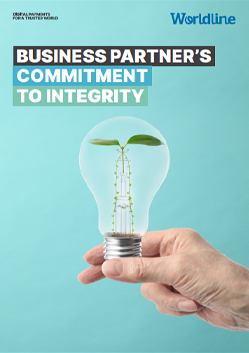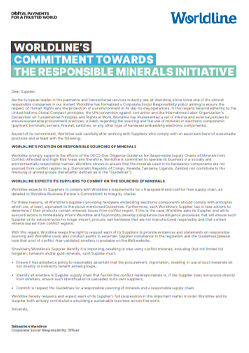How Worldline embeds the highest CSR standards into its supply chain through its sustainable procurement strategy providers
27 / 01 / 2022
As part of its Sustainable Procurement strategy, Worldline’s ambition is to positively influence its ecosystem by implementing the best CSR practices, notably towards its suppliers and business partners, in order to ensure the highest level of integrity and ethics throughout its supply chain. This ambition is fully embedded in Worldline TRUST 2025 CSR transformation programme, setting ambitious targets to be achieved in the area of Sustainable Procurement in order to reduce operational, environmental, social and financial risks while protecting our brand reputation.

Rising up the best Sustainable Procurement practices throughout our value chain
On April 2013, the collapse of the Rana Plaza building in Bangladesh, which housed five garment factories, left 1138 people dead and almost 2000 injured exposing the poor conditions of workers and the lack of accountability for contractors. This tragedy accelerated the evolution of procurement organizations and legal frameworks were set in place to encourage companies to thoroughly considerate their social and environmental risks throughout their value chain.
Since 2007, France has been a forerunner in this field and its NF X50-135 standard in 2012 turned into the ISO 20400 standard in 2017, still relevant today. Worldline developed its sustainable procurement strategy fully aligned with the expectations of the ISO 20400 norm in order to reduce or cancel the negative impacts resulting of the procurement activity throughout its whole supply chain.
As part of its TRUST 2025 programme, Worldline aims at levelling-up its ambition far beyond legal requirements in the area of Sustainable Procurement. By committing itself to implement the utmost CSR standards to promote the ESG best practices among its suppliers, Worldline strives to positively influence its ecosystem and to guarantee the highest level of transparency of its supply chain. For the years to come, Worldline has set itself the following KPIs regarding Sustainable Procurement:
- 100 % of suppliers evaluated by EcoVadis with a score below 45 having an action plan to solve critical findings identified by 2025 ;
- 80 % of expenses assessed by EcoVadis (strategic suppliers expenses) by 2025;
- % of strategic suppliers evaluated by EcoVadis
- % of buyers annually trained on sustainable procurement (including Conflict Minerals);
- % of spending on local suppliers (the vendor is located in the country of the purchase).
As a result and to reach its goals, Worldline has accelerated its action plan and articulated its global sustainable procurement strategy around three axes to further develop and deepen its sustainable procurement actions:
- Ensure due diligence through its suppliers’ risk assessments including extra-financial and financial screening, suppliers CSR questionnaire, CSR inherent risk matching (country, purchase category) and the systematic agreement of our suppliers with Worldline Business Partner’s Commitment to Integrity charter;
- Promote sustainable procurement practices including the implementation of the Buyer Code of Conduct, the General Purchasing Terms and Conditions and Specific Clauses, a CSR Training for buyers and the inclusion of CSR Criteria in supplier sourcing;
- Improve continuously its suppliers’ performance (including sustainability) through the categorization of suppliers, a Performance review (including EcoVadis rating) for Strategic suppliers and an annual risk monitoring for suppliers.
Putting our ambitious Sustainable Procurement strategy in motion
1/ Guaranteeing the utmost ethical standards:
Worldline’s guidelines and CSR best practices towards its suppliers are described in different internal and external documents:
The Code of Conduct (for internal use): Worldline’s employees who perform procurement-related activities on behalf of the Company or who have regular contacts with suppliers must abide by a strict Code of Conduct. All the members of the Procurement department must take notice and sign this document establishing the elementary rules each employee must follow in the performance of their work.

The Business partner’s commitment to integrity charter : It summarizes the principles and actions all Worldline partners should comply with in order to be able to work with the Company. Thus, it encourages them to follow the principles of the United Nations Global Compact in the areas of Human Rights, labour, environmental preservation and anti-corruption.

The Commitment letter towards the Responsible Minerals Initiative signed by the CSR Officer and aiming at providing hardware suppliers (of terminals and data centre components for instance), with a policy, expectations and specific guidelines on how to assess their minerals sourcing. Indeed, Worldline is committed to ensuring that the minerals used in its hardware’s components are neither sourced from conflict regions (e.g. Democratic Republic of Congo, Rwanda, Tanzania, Uganda, Zambia), nor finance armed groups. In this regards, the Company strongly supports the efforts of the OECD Due Diligence Guidance for Responsible Supply Chains of Minerals from Conflict-Affected and High-Risk Areas.
2/ Embedding sustainability at the heart of decision-making process for new partners’ selection:
To build strategic and sustainable relationships, Worldline uses a specific QCDIMS framework (QCDIMS stands for quality, cost, delivery, innovation, management and sustainability) to select its suppliers during the Request for Proposal process. Sustainability is an integral part of the decision-making process for selecting new partners as the sustainability criterion aims to weight not less than 10% in the QCDMIS qualification. Sustainability embeds the EcoVadis score, but also other criteria under construction and at the initiative of the buyers such as energy efficiency or the eco design of a solution, involvement of sheltered workshops employing people with disabilities, among others.
Additionally, Worldline strives to develop as much as possible local purchase to positively contribute to the economy and inclusion of its territories but also to reduce transport and environmental footprint when possible.
Finally, Worldline commits to involving the sheltered workshop through its different business activities, such as: facility management, electronic waste disposal, information processing, event organization. In 2020, Worldline has started a partnership with the GESAT, a social integration partner to have a directory of EA/ESAT (sheltered workshops) actors according to activities/geographies that could be used when selecting a supplier.
3/ Continuously increasing CSR awareness and performance among key suppliers:
The implementation of Worldline Sustainable Procurement strategy may also entail a deepened dialogue with key suppliers. Worldline suppliers’ continuous CSR improvement programme is based on EcoVadis scorecard with a minimum expectation score defined by Worldline and in accordance with EcoVadis’ medals levels.
In this regard, Worldline communicates its expectations towards low performer suppliers at least annually, and offers them support in defining an improvement roadmap, through dedicated one-to-one exchanges at the initiative of the supplier.
Sustainable Procurement @ Worldline in key figures
Concretely in 2020 (2021 figures still pending), Worldline achieved the following results (Worldline entities scope only, 2021 consolidated figures for Worldline & Ingenico scope are still pending):
- 5,500 active tier 1 suppliers (including about 2,800 subcontractors working in over 12 countries);
- 88 different suppliers (at parent company level) were assessed by EcoVadis in Worldline platform representing 35% of the top 250 suppliers in terms of spending and 54% of the total spending of this top 250 suppliers;
- The average score of Worldline suppliers assessed nearly reached 60/100, above the average score of all companies assessed by EcoVadis globally;
- Worldline spending reached 1.8 billion euros with the following breakdown of suppliers by geographies: 12% Asia 81% Europe 6% Latin America 1% North America 0;
- The proportion of spending on local suppliers represented 79% of total spending within Worldline Group.
For the years to come, Worldline intends to pursue its intensive efforts to promote CSR best practices throughout its value chain by reaching its TRUST 2025 targets. The solid monitoring processes put in place these past years were an intermediate step which was essential in order to positively contribute to change the entire ecosystem with sustainability practices, while maintaining an economic prosperity.
To learn more about our TRUST 2025 Programme and discover our new ambitions, please read our dedicated PR, our Integrated Report 2020 or visit our CSR dedicated webpage on our corporate website.
For more information about Worldline CSR journey, feel free to contact us at InfoCSR@worldline.com
